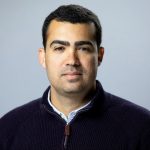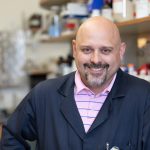Four UW faculty recognized with Early Career Innovator Awards
The Office of the Vice Chancellor for Research (OVCR) has announced the recipients of the 2024 Early Career Innovator Award, which recognizes four UW–Madison early career faculty for engaging in technology transfer and commercialization activities and transforming their research discoveries into inventions for the public good.
This year’s awardees are: Joao Reboucas Dorea, assistant professor of precision agriculture and data analytics; Chirag Gupta, assistant professor of electrical and computer engineering; Reinier Hernandez, assistant professor of medical physics; and Shubhra S. Pasayat, assistant professor of electrical and computer engineering.
“UW-Madison is a great place to be an innovator, and this year’s awardees are a testament to that fact. Each has successfully combined knowledge and imagination to generate technologies and products to help solve our nation’s continuing and emerging challenges – from those facing dairy farmers, to treating advanced metastatic cancers,” says Cynthia Czajkowski, interim vice chancellor for research. “These early career inventors embody the Wisconsin Idea by bringing their discoveries to market, and we are excited to see where their transformative discoveries and future innovations will lead. Recognizing early career faculty for their entrepreneurship is a wonderful way to elevate the rich history of UW–Madison researchers and discoveries leading to innovations for the public good.”
These awardees were selected by the OVCR from a list of finalists provided by the Wisconsin Alumni Research Foundation (WARF). Awardees receive $50,000 in funding. Each has had multiple disclosures and inventions accepted for commercialization.
“WARF has immensely enjoyed working with all four of these faculty members to patent and commercialize their innovative research,” says WARF CEO Erik Iverson. “We are pleased that the university has chosen to honor them this year and proud to provide grant funding in recognition of the enormous potential they have demonstrated early in their careers.”
 Joao Reboucas Dorea, assistant professor of precision agriculture and data analytics
Joao Reboucas Dorea, assistant professor of precision agriculture and data analytics
Dorea also holds affiliate positions in the Department of Biological Systems Engineering and the UW Data Science Institute. Dorea’s research focuses on using Artificial Intelligence (AI) and sensing technologies to uncover complex biological interactions in farm animals, driving advancements in agricultural practices. Dorea, using large computer vision systems, monitors thousands of animals. He and his lab then use AI to study animal nutrition, health, and welfare to improve farm management decisions.
 Chirag Gupta, assistant professor of electrical and computer engineering
Chirag Gupta, assistant professor of electrical and computer engineering
Gupta’s research group develops nitride semiconductors which have found numerous applications in both commercial (such as visible and UV LEDs, power supplies, fast phone chargers) as well as the defense sector (radars, lasers). The goal of his research is to develop commercialization compatible solutions to serve the emerging technological needs in the area of energy efficiency, wireless communications and extreme environment electronics. His research is supported by the NSF, DARPA, ARPA-E, ONR, AFOSR, industry and UW–Madison (ECE, CoE, WARF and VCR). In addition, he co-founded and currently serves as the Chief Scientific Officer of Ingantec corporation, a start-up focused on developing visible micro-LED solutions for next generation display technology.
 Reinier Hernandez, assistant professor of medical physics
Reinier Hernandez, assistant professor of medical physics
Dr. Hernandez is an assistant professor of medical physics and radiology at UW–-Madison, where he leads the Advanced RadioTheranostics (ART) laboratory. His laboratory centers on developing cutting-edge, targeted therapies to treat advanced metastatic cancers, with a with a particular focus on developing novel radiopharmaceutical therapy (theranostic) agents.
He leads clinical translational efforts of three theranostic agents co-developed in his lab, targeting prostate specific membrane antigen, a protein found on the surface of prostate cancer cells; carbonic anhydrase IX, has an important role in tumor progression, acidification, and metastasis; and cancer lipid metabolism. Dr. Hernandez’s scientific accomplishments include awards in nuclear medicine and molecular imaging from the National Science Foundation and several professional societies, more than 75 peer-reviewed publications, two book chapters, and several international patents.
 Shubhra S. Pasayat, assistant professor of electrical and computer engineering
Shubhra S. Pasayat, assistant professor of electrical and computer engineering
Pasayat develops high purity semiconductor films for use in microscale devices with applications in defense, energy conversion and consumer electronics. She and her students work on various projects funded by NSF, ARPA-E, ONR, AFOSR, ARO, and multiple industrial entities. She has co-founded and serves as the Chief Technology Officer of Ingantec Corporation, to commercialize micrometer scale visible light emitters, based on the technology she co-invented. Pasayat has authored/ co-authored more than 10 patents and 35 journal publications, and more than 50 conference publications. Her work is recognized by NSF CAREER award, Harold M. Manasevit Young Investigator Award, among others. Her research group, comprised of technologists, is looking to solve emerging societal challenges related to high-speed communications for 6G and beyond, as well as light emitter sources spanning UV to near IR range.
By Natasha Kassulke, natasha.kassulke@wisc.edu
###
